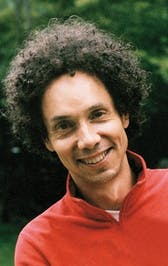It’s been a long time since I’ve heard author Malcolm Gladwell, and it’s been a long time for him since he last was asked to speak at the annual SHRM Conference and Exhibition.
By Gladwell’s recollection, it has been seven (7) years ago, which would make his last SHRM conference appearance in 2005 in San Diego. “That’s a long time to wait by the phone,” he noted.
So it was great to have Gladwell — author of books like The Tipping Point, Blink, and Outliers — back at SHRM again, mainly because he is always insightful and always has something extremely interesting to say. I’ve heard him speak about a half-dozen times at various conferences and events, and unlike other speakers, he never seems to give the same talk twice. Just that should tell you something about him.
Here in Atlanta, Gladwell focused on a topic near and dear to many of your hearts: Why is the Millennial generation different, and what is distinctive about this generation?
“First, true products of the digital age”
It’s a little tough to summarize all the stories and anecdotes that Gladwell went through to get to the answer, but it sort of comes down to this: Millennials “are the first, true products of the digital age … and they have a profoundly different notion of how organized groups should behave.”
Millennials, he explained, are all about networks and social organizations rather than hierarchies when it comes to their default organizational model. It’s the difference between how Dr. Martin Luther King Jr. organized the civil rights movement of the 1950s and 1960s versus how the recent Occupy movement was set up.
In Gladwell’s view, hierarchies are disciplined, centralized (generally with one person at the top and a clear strategy from the leadership team), and makes a distinction between people on the outside and the inside (that is, you need to actually decide to join in). The civil rights movement, as set up by Dr. King, was a classic hierarchy, Gladwell observed.
The Occupy movement, by contrast, was none of those things. It had no leader like King, no central ideology or strategy (like the non-violent, Gandhi-like strategy at the heart of the civil rights movement), and no real organization or discipline. And, it’s why so many Baby Boomers and people from the older generations, who have worked most of their lives under hierarchical structures, don’t get what the Occupy protesters and movement is all about.
“One form is not better than the other,” Gladwell noted. “They’re two different forms with very different sets of strengths and weaknesses.” And in his view, we need to use both hierarchies AND networks if we are really going to succeed now and in the future.
Understanding the tensions between both models
The best organizations, he said, understand the tensions between both models, and he pointed to Apple as a company that has been able to successfully navigate the two. Not only was Apple able to bring the best of the networking model to their products, but they were also a very defined hierarchy under the late Steve Jobs, who Gladwell described as a “dictator of one.”
He also pointed to the recent Arab Spring movement and the results of this past week’s elections in Egypt. Yes, the Arab Spring movement that led to the overthrow of President Hosni Mubarak may have been driven by Millennials, social media, and the network effect, but in the end, all of those people lost in the presidential election that was won by a Muslim Brotherhood candidate who had nothing to do with them.
“Networks may start revolutions,” Gladwell said, “but they can’t finish them. Our job is to remind Millennials of the importance of hierarchies as well as networks.”
I hardly can do justice to Gladwell’s nuanced and detailed examples of the difference between hierarchies and networks, but you probably get the gist of what he had to say. It just goes to show that Malcolm Gladwell never fails to deliver in his presentations — and hopefully, SHRM won’t wait another seven years to invite him back to their annual conference.
